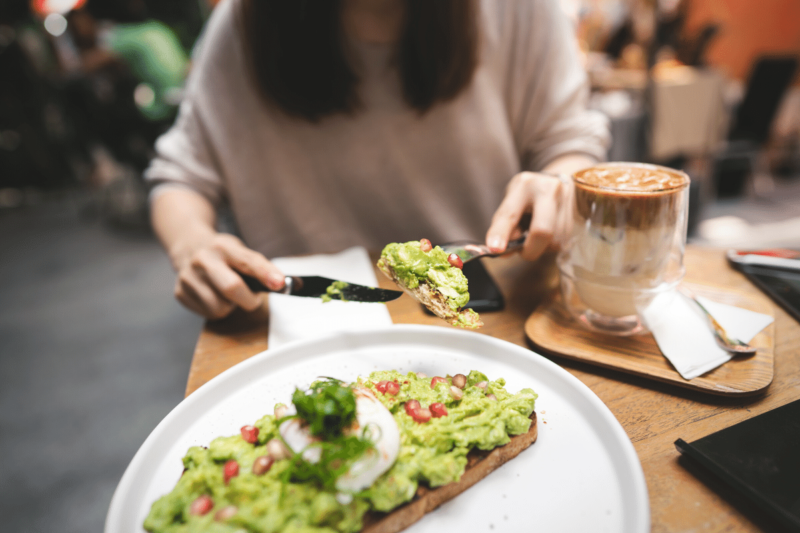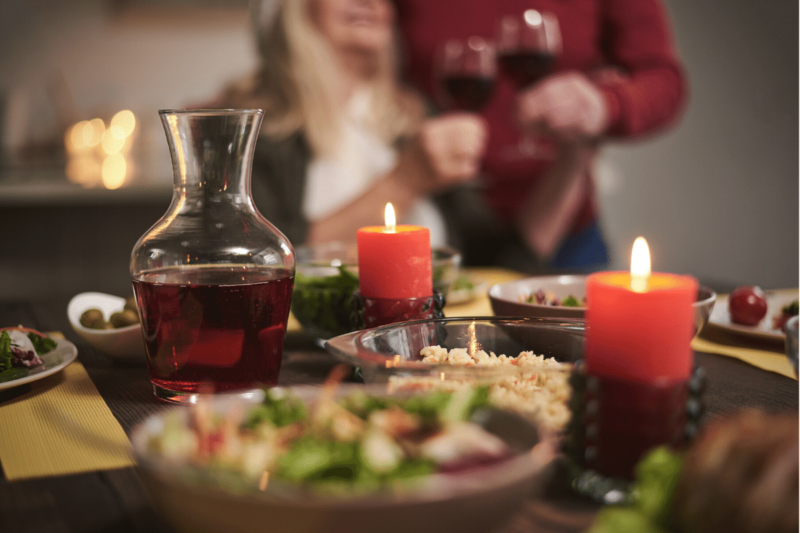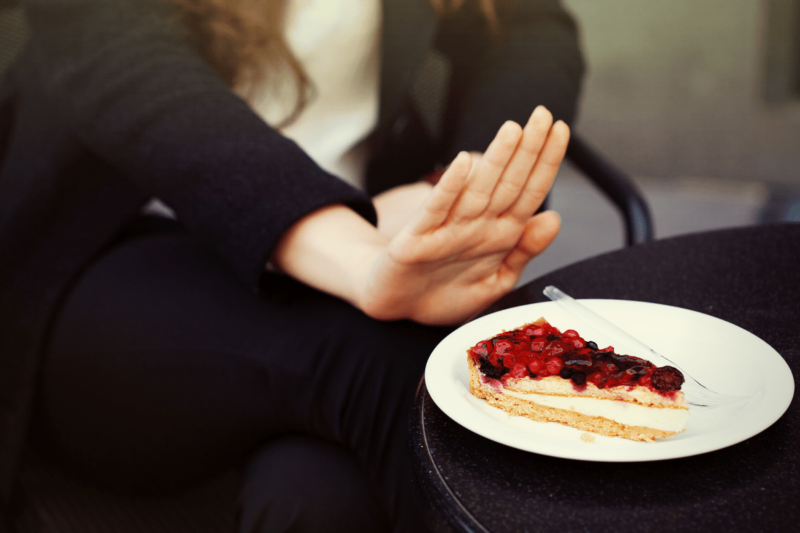
If you already tend to have anxieties about food — maybe you have a history of dieting or eating disorders, or simply grapple with emotional or stress eating — the holiday food environment can make you especially anxious. Overindulging, whether real or perceived, can lead to guilt, remorse and possibly to a vicious cycle of restricting and bingeing.
Complicating matters is the fact that in many parts of the country the holidays are accompanied by shorter daylight hours and the kind of weather that contributes to low mood and creates obstacles to physical activity. Here’s some food for thought about how to approach holiday eating that brings you joy and leaves you feeling good, too.

Nourish your body and tend to your hunger
The holiday season is supposed to be joyful, but it can also be stressful, with overloaded schedules and numerous social obligations. Chaotic days often lead to chaotic eating, which may mean overeating, undereating or mindless eating.
Getting too hungry leaves you vulnerable to eating sugary, high-calorie foods on impulse, partly because hunger is a response to dwindling blood sugar levels — your body is literally crying out for fuel. Staying well nourished by eating regular meals and snacks (every 3-5 hours, depending on your individual needs) will keep you from becoming overly hungry and making a desperate grab for the sugar cookies.
Plan ahead so you have nutritious food in the house or know where you can grab a nourishing lunch while out shopping. This will leave you feeling far better than if you are surviving on lower-nutrient foods. Who wants to spend the holidays feeling sluggish?
It’s also important to tend to your hunger in other ways. Trying to compensate for “overeating” at dinner by skipping breakfast the next morning can backfire by making you overly hungry later that day. Similarly, “saving up” for a special dinner by eating next to nothing for breakfast or lunch can lead to eating to uncomfortable fullness at that dinner. If you’re hungry, you deserve to eat, and we tend to enjoy our food the most when we’re gently hungry, not ravenous.

Nourish your emotions and practice self-care
The holiday season brings both stress and joy and can be loaded with triggers for emotional or comfort eating — and sometimes overeating. While there’s nothing wrong with using food to soothe sometimes, it shouldn’t be your only way of coping.
Because family dynamics can throw fuel on emotional fire, now is an excellent time to take stock of the tools in your emotional coping strategies toolbox. The more you can use food for sustenance and pleasure — and avoid using it to cope with stress or emotions that the holidays might bring to the surface — the better you’ll ultimately feel.
- If there are certain rituals or activities that help you stay sane — morning yoga, a daily walk, some quiet alone time to read or just be — establish some personal boundaries to protect that you-time during the busy holiday season.
- When you feel yourself in the grip of stress or strong and uncomfortable emotions, ask yourself, “What am I feeling?” You may know you feel “bad,” but are you specifically feeling sad? Anxious? Pressured? Misunderstood? Invalidated? Being able to name what you’re feeling can lessen some of the feeling’s power, and let you…
- …ask yourself, “What do I need?” What would help you feel less sad, less anxious, more validated? It can be helpful to make a list of activities in advance that you can use in a pinch to lift your mood, calm your anxiety, or simply distract yourself. For example, calling a friend, watching a favorite movie, listening to music, meditating, taking a bath, petting your dog or cat, getting out of the house. If you know a particular meal will be stressful, bookend it with one or more of these activities.

Be curious and eat mindfully
When you are about to reach for food, ask yourself “Am I hungry?” and “Is this what I really want to be eating right now?” if the answer to either one is “No,” consider reconsidering. At the very least, asking yourself those two questions gives you a moment to make a conscious decision, rather than acting on autopilot. When you are eating, pay attention. Eating mindfully helps you make better, more fulfilling food choices — and enjoy them to the fullest.
If you often feel overfull at the end of holiday meals, maybe because you don’t want the deliciousness to end or because you’re eating to soothe family strife or social awkwardness, ask yourself this question before you start eating: “How do I want to feel when I get up from the table? Comfortably full and satisfied, or uncomfortably full and in need of a nap?”
It can be helpful to stage a mental dress rehearsal. Imagine yourself choosing the foods that taste good and feel good to your body. Imagine yourself mindfully savoring them and walking away feeling satisfied, not stuffed.
Then, when you are actually eating, try to stay tuned in to the sensory aspects of your food as you’re eating — the taste, texture, temperature and aroma — as well as signs that you are getting full. Allowing yourself maximum enjoyment may make it easier to say, “enough.”

Establish food boundaries
Rehearsing is also helpful for dealing with food pushers, especially if you have people-pleasing tendencies. Imagine yourself politely but firmly declining food you don’t want, no matter how well-intentioned the offer. To thwart food pushers without stepping on toes, start with a compliment and finish with a deflection, such as “Mmmm…that looks delicious. I’m not hungry right now, but I’ll have some later” or “The food was all too wonderful…I literally could not eat another bite.” Most food pushers are trying to be a good host—or looking for validation of their culinary skills—but the end result is the same if you end up eating food you don’t need or want.
Disclaimer: All information provided here is of a general nature and is furnished only for educational purposes. This information is not to be taken as medical or other health advice pertaining to an individual’s specific health or medical condition. You agree that the use of this information is at your own risk.
Hi, I’m Carrie Dennett, MPH, RDN, a weight-inclusive registered dietitian, nutrition therapist and body image counselor. I offer compassionate, individualized care for adults of all ages, shapes, sizes and genders who want to break free from eating disorders, disordered eating or chronic dieting. If you need to learn how to manage IBS symptoms with food, or improve your nutrition and lifestyle habits to help manage a current health concern or simply support your overall health and well-being, I help people with that, too.
Need 1-on-1 help for your nutrition, eating, or body image concerns? Schedule a free 20-minute Discovery Call to talk about how I can help you and explore if we’re a good fit! I’m in-network with Regence BCBS, FirstChoice Health and Providence Health Plan, and can bill Blue Cross and/or Blue Shield insurances in many states. If I don’t take your insurance, I can help you seek reimbursement on your own. To learn more, explore my insurance and services areas page.
 Print This Post
Print This Post






